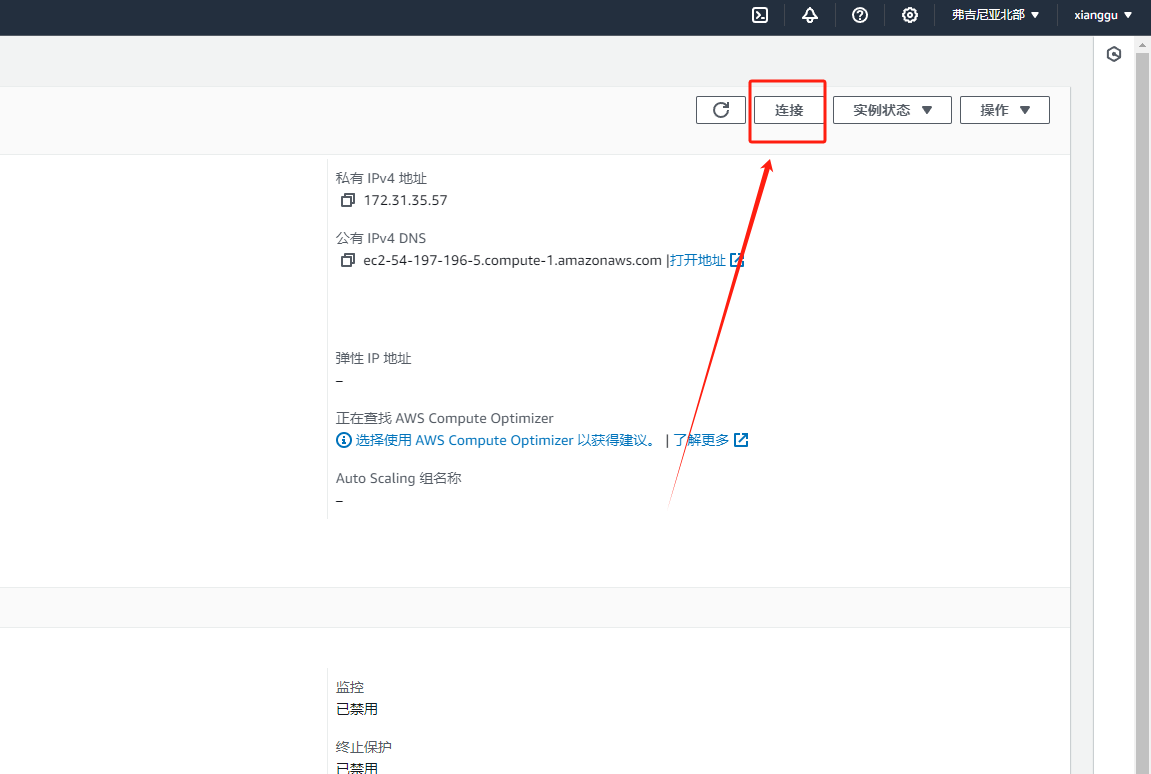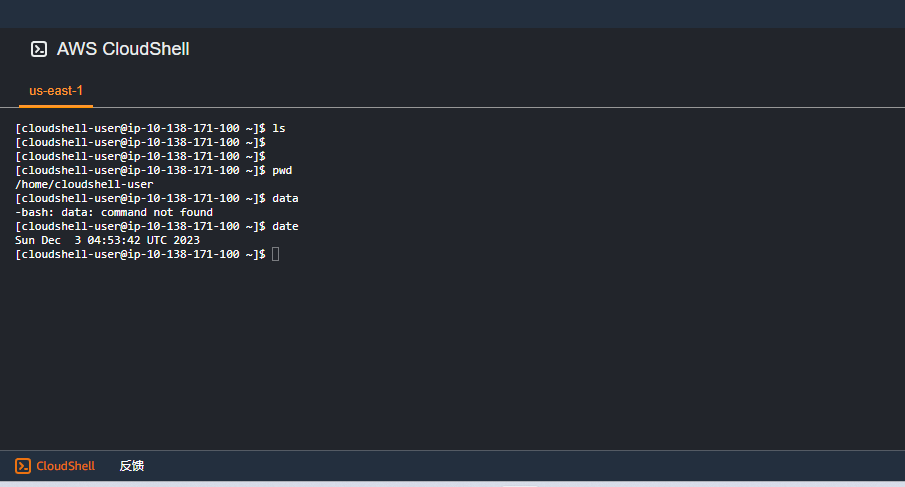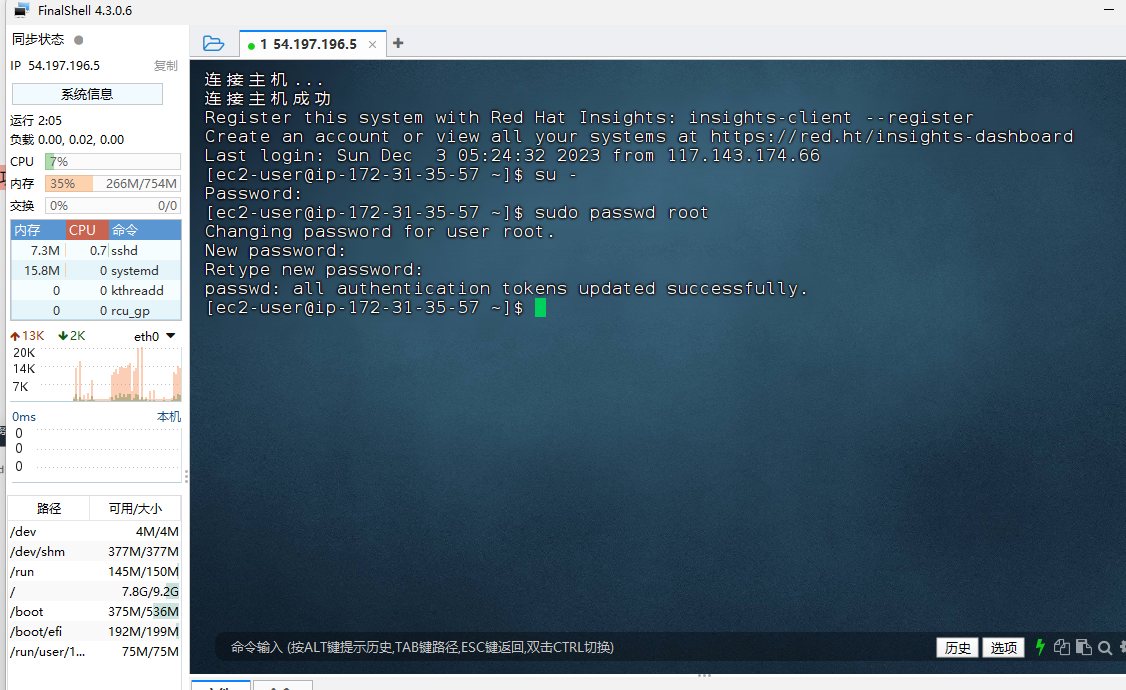授权声明:本篇文章授权活动官方亚马逊云科技文章转发、改写权,包括不限于在 Developer Centre, 知乎,自媒体平台,第三方开发者媒体等亚马逊云科技官方渠道
亚马逊EC2云服务器(Elastic Compute Cloud)是亚马逊AWS(Amazon Web Services)提供的一种云计算服务。EC2代表弹性计算云,它允许用户租用虚拟计算资源,包括CPU、内存、存储和网络带宽,以满足计算需求。
由于亚马逊云科技服务种类较多,且计费详细,很多用户有些看不懂,所以对使用亚马逊云科技云服务器望而却步。其实亚马逊云科技很多服务都有免费套餐,以让用户体验,这些服务的免费套餐,搭建一个Nginx服务绰绰有余。
1. 亚马逊EC2云服务器和nginx介绍
亚马逊EC2云服务器的主要特点和优势包括:
- 灵活性:用户可以根据需要随时启动、停止、调整和删除EC2实例,以便满足不断变化的计算需求。
- 可靠性:亚马逊EC2服务器提供高可用性和容错性,确保用户的应用程序能始终保持运行状态。此外,亚马逊EC2的服务等级协议承诺为每个EC2地区提供99.99%的可用性。
- 安全性:亚马逊EC2服务器提供了多层安全措施,包括网络隔离、数据加密和身份验证,以保护用户的数据和应用程序免受攻击。
- 成本效益:亚马逊EC2服务器采用按需计费模式,用户只需支付实际使用的计算资源费用,无需预先投资硬件或承担维护和管理物理服务器的费用。
- 可扩展性和功能性:亚马逊EC2提供了根据需要扩大或缩小规模的设施,能轻松处理各种动态场景。它还为用户提供了一个真正的虚拟计算平台,可以在其中执行各种操作,甚至可以从这个虚拟环境中启动另一个亚马逊EC2实例。
关于如何购买亚马逊云服务器,我这里不再重复赘述,详细可以查看这篇文章:https://blog.csdn.net/qq_43475285/article/details/134256935
Nginx(发音为“engine x”)是一个功能强大的Web服务器,其设计目标是实现高性能、高并发和高可扩展性的网络应用。它是由伊戈尔·赛索耶夫(Igor Sysoev)为Rambler.ru开发的,并以类BSD许可证的形式发布了源代码。
- 高性能:Nginx被设计为可以处理大量并发连接,而只使用较少的内存和CPU资源。它采用事件驱动的架构和异步非阻塞的处理方式,这意味着它可以在高负载情况下保持高效和稳定。
- 反向代理:Nginx可以用作反向代理服务器,这意味着它可以接收来自客户端的请求,然后转发给内部网络上的其他服务器。这可以帮助平衡负载、提高安全性和性能。
- 简单的配置:尽管Nginx功能强大,但其配置文件通常相对简单明了。这使得管理员可以轻松地调整和优化服务器设置,以满足特定的需求。
- 丰富的模块支持:Nginx具有一个模块化的架构,这意味着管理员可以选择和启用所需的模块,以实现特定的功能,如SSL/TLS加密、压缩、认证等。
- 电子邮件服务:除了HTTP服务外,Nginx还支持IMAP/POP3/SMTP等电子邮件协议,使其可以作为邮件代理服务器使用。
- 广泛的应用:由于其高性能和灵活性,Nginx被广泛应用于各种规模和类型的网站和应用中,从小型个人网站到大型企业级应用都可以看到它的身影。在中国大陆,像百度、京东、新浪、网易、腾讯、淘宝等知名网站都使用Nginx作为他们的Web服务器或反向代理服务器。
- 开源和免费:Nginx是开源的,并在BSD-like协议下发布,这意味着任何人都可以免费使用、修改和分发它。这为企业和个人提供了巨大的灵活性和成本效益。
2. 登录云服务器
2.1 EC2云服务器准备
在购买好云服务器后,进入控制台https://us–east-1.console.aws.amazon.com/console


关于登录到云服务实例终端,有很多种方法,最方便的是在实例详细信息右上角点击连接

可以选择使用Instance Connect 进行连接或者Instance Connect 端点进行连接,可以直接在web端进行终端控制


2.2 EC2云服务器远程访问
常见的终端shell访问软件有Finalshell,putty,xshell等等。我这里使用的是finalshell

sudo passwd root

3. nginx部署
[root@ip-172-31-30-217 ~]# cd /usr/local
[root@ip-172-31-30-217 local]# mkdir nginx
[root@ip-172-31-30-217 local]#
[root@ip-172-31-30-217 local]# cd /usr/local/nginx
[root@ip-172-31-30-217 nginx]#
打开nginx官网:https://nginx.org/download/nginx-1.20.2.tar.gz
[root@ip-172-31-30-217 nginx]# wget https://nginx.org/download/nginx-1.20.2.tar.gz
--2023-12-05 15:36:43-- https://nginx.org/download/nginx-1.20.2.tar.gz
Resolving nginx.org (nginx.org)... 3.125.197.172, 52.58.199.22, 2a05:d014:edb:5704::6, ...
Connecting to nginx.org (nginx.org)|3.125.197.172|:443... connected.
HTTP request sent, awaiting response... 200 OK
Length: 1062124 (1.0M) [application/octet-stream]
Saving to: ‘nginx-1.20.2.tar.gz’
nginx-1.20.2.tar.gz 100%[===============================================================================>] 1.01M 1.58MB/s in 0.6s
2023-12-05 15:36:45 (1.58 MB/s) - ‘nginx-1.20.2.tar.gz’ saved [1062124/1062124]
[root@ip-172-31-30-217 nginx]# tar -xvf nginx-1.20.2.tar.gz
[root@ip-172-31-30-217 nginx] yum -y install gcc zlib zlib-devel pcre-devel openssl openssl-devel
make
make install
[root@ip-172-31-30-217 nginx-1.20.2]# cd /usr/local/nginx/sbin
[root@ip-172-31-30-217 sbin]# /usr/local/nginx/sbin/nginx -c /usr/local/nginx/conf/nginx.conf
[root@ip-172-31-30-217 sbin]# ./nginx -s reload
[root@ip-172-31-30-217 sbin]#
[root@ip-172-31-30-217 sbin]# ps -ef | grep nginx
root 46530 1 0 15:41 ? 00:00:00 nginx: master process /usr/local/nginx/sbin/nginx -c /usr/local/nginx/conf/nginx.conf
nobody 46988 46530 0 15:41 ? 00:00:00 nginx: worker process
root 47865 18177 0 15:42 pts/0 00:00:00 grep --color=auto nginx
4. 配置静态html至EC2并访问
root@ip-172-31-30-217 sbin]# cd /
[root@ip-172-31-30-217 /]# mkdir work
[root@ip-172-31-30-217 /]# cd work/
[root@ip-172-31-30-217 work]# mkdir statics
[root@ip-172-31-30-217 work]# echo 基于亚马逊EC2云服务器配置Nginx静态网页 >> index.html
[root@ip-172-31-30-217 work]# cd statics/
[root@ip-172-31-30-217 statics]# mv ../index.html .
[root@ip-172-31-30-217 statics]# ls
index.html
[root@ip-172-31-30-217 statics]# cd /usr/local/nginx/ & cd conf
vim nginx.conf
[root@ip-172-31-30-217 conf]# cat nginx.conf
#user nobody;
worker_processes 1;
#error_log logs/error.log;
#error_log logs/error.log notice;
#error_log logs/error.log info;
#pid logs/nginx.pid;
events {
worker_connections 1024;
}
http {
include mime.types;
default_type application/octet-stream;
#log_format main '$remote_addr - $remote_user [$time_local] "$request" '
# '$status $body_bytes_sent "$http_referer" '
# '"$http_user_agent" "$http_x_forwarded_for"';
#access_log logs/access.log main;
sendfile on;
#tcp_nopush on;
#keepalive_timeout 0;
keepalive_timeout 65;
#gzip on;
server {
listen 80;
server_name localhost;
#charset koi8-r;
#access_log logs/host.access.log main;
location / {
root /work/statics/;
index index.html index.htm;
}
#error_page 404 /404.html;
# redirect server error pages to the static page /50x.html
#
error_page 500 502 503 504 /50x.html;
location = /50x.html {
root html;
}
# proxy the PHP scripts to Apache listening on 127.0.0.1:80
#
#location ~ .php$ {
# proxy_pass http://127.0.0.1;
#}
# pass the PHP scripts to FastCGI server listening on 127.0.0.1:9000
#
#location ~ .php$ {
# root html;
# fastcgi_pass 127.0.0.1:9000;
# fastcgi_index index.php;
# fastcgi_param SCRIPT_FILENAME /scripts$fastcgi_script_name;
# include fastcgi_params;
#}
# deny access to .htaccess files, if Apache's document root
# concurs with nginx's one
#
#location ~ /.ht {
# deny all;
#}
}
# another virtual host using mix of IP-, name-, and port-based configuration
#
#server {
# listen 8000;
# listen somename:8080;
# server_name somename alias another.alias;
# location / {
# root html;
# index index.html index.htm;
# }
#}
# HTTPS server
#
#server {
# listen 443 ssl;
# server_name localhost;
# ssl_certificate cert.pem;
# ssl_certificate_key cert.key;
# ssl_session_cache shared:SSL:1m;
# ssl_session_timeout 5m;
# ssl_ciphers HIGH:!aNULL:!MD5;
# ssl_prefer_server_ciphers on;
# location / {
# root html;
# index index.html index.htm;
# }
#}
}
[root@ip-172-31-30-217 conf]#
- 重启nginx
/usr/local/nginx/sbin/nginx -c /usr/local/nginx/conf/nginx.conf
./nginx -s reload
访问web服务
[root@ip-172-31-30-217 html]# curl http://3.94.103.16
welcome to aws ec2


./nginx -s reload # 重新加载nginx配置文件并重启nginx
./nginx # 启动nginx
./nginx -s stop # 强制停止nginx
./nginx -s reopen # 重启nginx
./nginx -s quit # 优雅的停止nginx
nginx -v # 查看nginx的版本
killall nginx # 杀死所有nginx进程
ps -ef | grep nginx # 查看nginx是否启动
原文地址:https://blog.csdn.net/qq_43475285/article/details/134820317
本文来自互联网用户投稿,该文观点仅代表作者本人,不代表本站立场。本站仅提供信息存储空间服务,不拥有所有权,不承担相关法律责任。
如若转载,请注明出处:http://www.7code.cn/show_47206.html
如若内容造成侵权/违法违规/事实不符,请联系代码007邮箱:suwngjj01@126.com进行投诉反馈,一经查实,立即删除!







